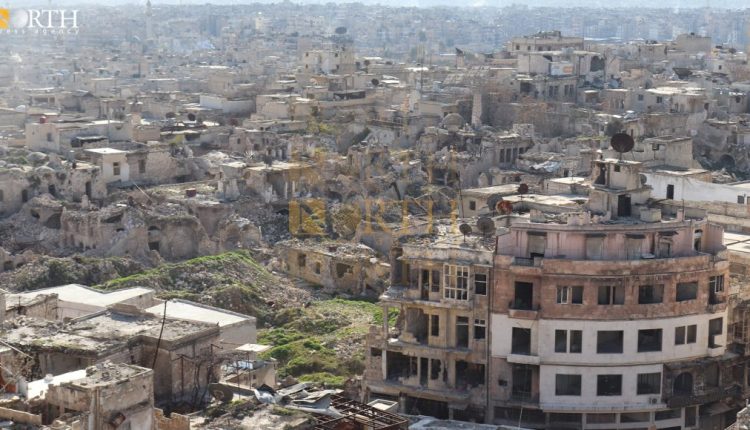
By Ardo Juweid
ALEPPO, Syria (North Press) – Destruction and neglect are evident in most neighborhoods of the city of Aleppo in northwestern Syria even after the Syrian government took control over them seven years ago. Residents who returned to their neighborhoods, recall the siege on the city when it was under the control of the armed groups of the opposition.
In late 2012, fierce battles broke out between the government forces and the armed opposition in the neighborhoods of the city. After the government forces continuously bombed the city with barrel bombs using military helicopters, it was left in ruins, with inhabitants living in dire conditions.
Even though the government regained control in late 2016, the eastern and old neighborhoods continue to suffer from the impacts of war and destruction.
There are over 22 war-damaged neighborhoods in Aleppo that are inhabited by over 1,300,000 residents. Those people face challenges including clearing debris and paving roads in addition to accessing to basic life necessities.
Unreal liberation
Ibrahim al-Halabi, a pseudonymous for a technical supervisor working with an association dedicated to the intangible heritage in Aleppo, describes the city’s situation in the seventh year of the government’s control with mockery and condemnation.
“The government ignores the destruction in Aleppo,” al-Halabi told North Press. “It [the government] follows a policy of a deliberate neglect towards most of the neighborhoods.”
“The Syrian government’s political and military leaderships decided to displace the original residents of the eastern neighborhoods and bring instead the people of the two Shiite towns of Kafraya and al-Fu’ah from Idlib Governorate,” he added.
The expert indicated that those measures have negatively affected the reconstruction of the devastated buildings that will take a long time, as many original residents were forced to travel to find an alternative shelter.
Despite the serious attempts to reconstruct the city, the decisions made by the government were against those who wanted to remove the rubble and rebuild their buildings because the government claims that those buildings and neighborhoods are illegal, i.e. they were built without getting approval from the municipality, and that the spaces where the buildings were built on are farmlands according to the municipal schemes.
The technical supervisor pointed out that the government’s neglect of Aleppo reflects a lack of interest regarding the comprehensive economic planning. Since it regained control over the city, the government has ignored the needs of the city’s residents and focused on other issues. “It spends billions of Syrian pounds annually on false projects which have had no positive impact on people’s lives, especially in the unaffected neighborhoods in western Aleppo,” al-Halabi said. “This led to further economic and environmental problems.”
